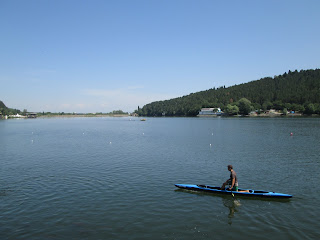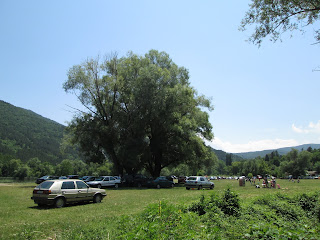 |
| Lake Pancharevo. |
You get there by a stuffy bus, along with sweaty fellow passengers: a man with a telescopic fishing rod in one hand, a bag of cherries in the other; another fellow whose fingernails seem to be blackened by a fungal infection; yet another one who, judging by his body smells, has not showered for at least a forthnight; he carries a large iron trolley; couples dressed for the beach; big and soft (I know because I had been squeezed into one for a big part of the trip) elderly ladies; shy Roma people who live in a community there by the lake.
Lake Pancharevo, a Sofian's beloved weekend escape.
You have four bus stops to choose from.
The first one is for the chlorinated mineral water pool called 'Korali' - 'a very beautiful pool', according to some locals. Well, to me it looks more like a crowded swimming pool next to any package hotel but many Sofians are happy to spend there all day. There is a bar in the middle, providing, besides the usual menu, a loud pop music soundtrack.
From 'Korali' you have views to the actual lake. As swimming in the lake is generally non-practised, soaking in the pool might give you a replacement illusion. I might go to 'Korali' in winter - they say, in winter one may still soak in the open air pool (as the mineral water is warm) - perhaps then I will appreciate the charms of the enclosed swimming place better.
My favourite bus stop is the second one: 'Grebna Baza'. It is for the national rowing sports base 'Sredets'. There, are small wooden piers in the water, and humble boat garages on the shore. Occassionally one can hear invisible someones doing aerobics above the garages; otherwise there are sounds by the rowers, their dogs, and birds. From there one also gets arguably the best views over the whole lake.
The third stop is for the Pancharevo residential area. Looking from a bus stop, the district appears like a walled fortress of nomenclature communist architecture, although I am still to explore it once the weather gets colder and waters of Pancharevo lose their summer charms.
If you get off at this third bus stop you will have to walk for a while to find an access to the actual lake - not an unpleasant walk though, leading along the road on one side; bushes and trees on the other.
The fourth stop, 'Pancharevo beach' is for a popular picnic zone. There is no beach here though; one may only lie on the grass or fish by the riverside (Pancharevo lake originates from the stemmed river Iskar) next to the signs saying 'swimming prohibited'. On summer weekends the area is full of parked cars.
Here is also a very popular pond a.k.a. fish farm that offers an option to catch your own fish (if you are not a fan you may buy one already caught). Among the many fishermen are people from the local Chinese community. One side of the pond is lined with domestic animal & bird cages and food stalls. While snacking one can observe ducks, geese and black swans commuting among the fishermen.
*
I feel slight terror as I swim through murky green waters at the rowing sports base. My arms, as I look through the goggles, appear ghostly pale in the background of algae, and I cannot see more than a foot ahead. It feels as if I am swimming over something bottomless and decomposing, and it would suck me in if I tried to dive a little bit deeper. I got in the water from one of the piers, and that's how I am going to get out. Swimming prohibited.
*
If you want to bathe nonetheless, there is one more option - to visit the mouldy local banya, a.k.a. the Pancharevo Bath. Men go to one side, women to the other, all take off their clothes, and enjoy the healing powers of naturally warm mineral waters, in their gender-designated bathing areas respectively. There are soaking baths, showers and taps to choose from. The banya is just behind the 'Korali, on the right side of the road as you walk from the first bus stop at the lake.
*
Lake Pancharevo: some illustrations.
 |
| Boat garrages. |
 |
| Canoeing. |
 |
| Where the river turns into a lake. |
 |
| Car park. |
 |
| Fishing. |
 |
| Fish shop at the pond. |
 |
| Ducks. |
 |
| The pond. |
 |
| 'Korali' pool. |
 |
| Pancharevo Bath. |
 |
| Fishing at the farm. |
To get to Lake Pancharevo, take the metro, Line 1, till the last stop, IEC-Tsarigradsko Shose, then bus number 1 or 3 for another twentyish minutes.
It costs 8-10 leva to enter 'Korali', depending on the day of the week, and 4 leva to cleanse yourself at the local banya.
There are a few averagely-priced Bulgarian food restaurants around the lake.
Text and photos (c) Agne Drumelyte, 2013.









